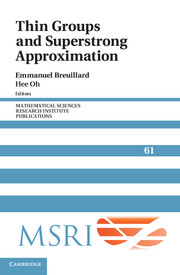Book contents
- Frontmatter
- Contents
- Preface
- Some Diophantine applications of the theory of group expansion
- A brief introduction to approximate groups
- Superstrong approximation for monodromy groups
- The ubiquity of thin groups
- The orbital circle method
- Sieves in discrete groups, especially sparse
- How random are word maps?
- Constructing thin groups
- Ergodic properties of the Burger–Roblin measure
- Harmonic analysis, ergodic theory and counting for thin groups
- Generic elements in Zariski-dense subgroups and isospectral locally symmetric spaces
- Growth in linear groups
- Strong approximation for algebraic groups
- Generic phenomena in groups: some answers and many questions
- Affine sieve and expanders
- Notes on thin matrix groups
How random are word maps?
Published online by Cambridge University Press: 29 May 2025
- Frontmatter
- Contents
- Preface
- Some Diophantine applications of the theory of group expansion
- A brief introduction to approximate groups
- Superstrong approximation for monodromy groups
- The ubiquity of thin groups
- The orbital circle method
- Sieves in discrete groups, especially sparse
- How random are word maps?
- Constructing thin groups
- Ergodic properties of the Burger–Roblin measure
- Harmonic analysis, ergodic theory and counting for thin groups
- Generic elements in Zariski-dense subgroups and isospectral locally symmetric spaces
- Growth in linear groups
- Strong approximation for algebraic groups
- Generic phenomena in groups: some answers and many questions
- Affine sieve and expanders
- Notes on thin matrix groups
Summary
Any word ω in the free group on d generators determines a function Gd → G for every group G. If ω is a fixed nontrivial word and G ranges over the finite simple groups, the resulting sequence of functions can be expected to enjoy some properties of a random sequence of functions. In this paper, we review the current state of the art, emphasizing open problems.
Let Fd denote the free group on d generators x1, . . . , xd and ω ∊ Fd a nontrivial element. For every group G, w defines a word map f ω G:Gd !G obtained by substituting for x1, . . . , xd respectively the coordinates g1, . . . , gd of a given element of Gd. A number of authors have examined the behavior of ƒ w,G when ƒis fixed and G ranges over some set of groups, especially the set of all (nonabelian) finite simple groups. A unifying theme behind a good deal of recent work is this question: for a given word ƒ, do the maps ƒ ƒ G behave like random functions Gd → G? The answer depends partly on the choice of w but also on what properties of random functions are desired. This paper examines some recent progress in understanding basic randomness properties of word maps, with an emphasis on open questions.
Information
- Type
- Chapter
- Information
- Thin Groups and Superstrong Approximation , pp. 141 - 150Publisher: Cambridge University PressPrint publication year: 2014
